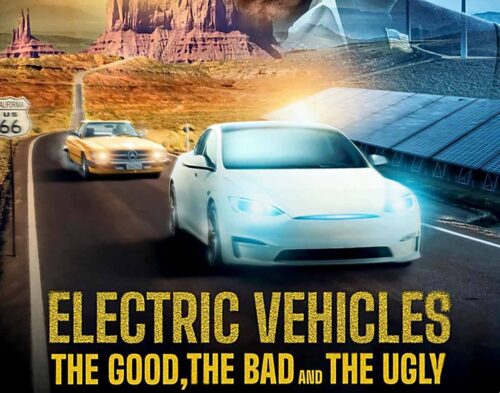by L. Elder, Apr 24, 2025 in ClimateChangeDispatch
A new documentary challenges the claimed environmental benefits of EVs over gas-powered cars.

Are electric vehicles better for the planet than gasoline-powered vehicles? This is the question we explore in my new documentary “Electric Vehicles: The Good, the Bad and the Ugly.”
Whether one agrees with former President Joe Biden, who calls climate change “an existential threat,” or whether one agrees with the late physicist Freeman Dyson, who dismissed Al Gore and his “An Inconvenient Truth” as “lousy science,” this question remains: are electric vehicles better for planet Earth than “gas guzzlers”? [emphasis, links added]
After all, fossil-fuel-generated energy is required to manufacture an electric vehicle and then to transport it to the dealership. The electricity required to charge it comes mostly from fossil-fuel-generated power.
Electric vehicles are a triumph of technology, with incredible features. They are quiet, fast, and fun to drive. The self-driving feature, while not foolproof, will likely save lives because human driving errors are more common. (There are some gas-powered cars with a similar feature.)
There are concerns about the driving range, as well as the availability of charging stations for long drives.
Right now, an EV compared to a gas-powered car of similar size may be more expensive. There are still tax incentives available, but they may be reduced, if not phased out at some point.
With the more expensive purchase price, mandates to buy an EV or to restrict the sale of gas cars stand to hurt those less well off.
Then there is the China factor. The computer chips required for the EV disproportionately come from China.
The minerals in the batteries — lithium, nickel, cobalt, and manganese — are mined, processed, and manufactured in China or places under China’s control, such as the Democratic Republic of the Congo.
Take cobalt in the Congo.
Two years ago, NPR wrote “How ‘modern-day slavery’ in the Congo powers the rechargeable battery economy.” It featured the work of Siddharth Kara, author of the book “Cobalt Red.” Kara said:
“People (including children) are working in subhuman, grinding, degrading conditions. They use pickaxes, shovels, stretches of rebar to hack and scrounge at the earth in trenches and pits and tunnels to gather cobalt and feed it up the formal supply chain. … Cobalt is toxic to touch and breathe — and there are hundreds of thousands of poor Congolese (workers) touching and breathing it day in and day out. Young mothers with babies strapped to their backs, all breathing in this toxic cobalt dust. … There’s complete cross-contamination between industrial excavator-derived cobalt and cobalt dug by women and children with their bare hands (for $1 or $2 a day).”
…
